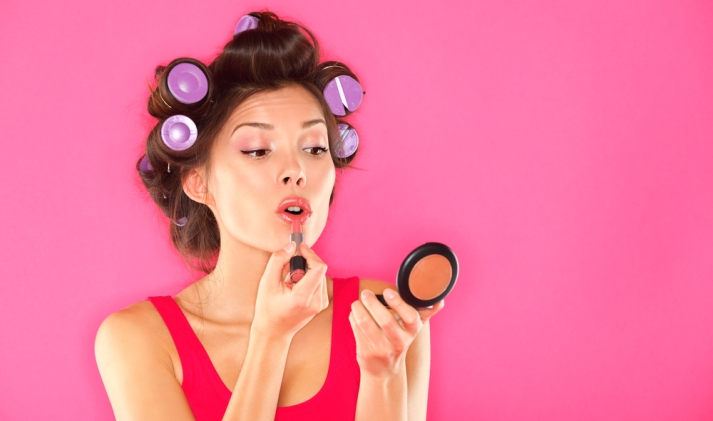
Scores of high-end cosmetics companies are setting up shop on Alibaba Group’s Tmall.com online marketplace as e-commerce continues to gain ground as a critical marketing and sales channel for reaching China’s increasingly sophisticated consumers.
At the Tmall Beauty Awards ceremony in Shanghai on Feb. 26, which celebrated the top cosmetics brands operating on the e-commerce platform, Alibaba announced that 29 well-known Western brands and 37 from Japan and Korea had storefronts on Tmall at the end of 2015, including more than 10 joining the platform last year alone such as Lancôme, Bobbi Brown, La Mer, Anessa and Avene. Another 20 cosmetics companies are planning to launch their own presence on Tmall this year.
Alibaba also announced a cooperation agreement with Korean cosmetics maker AmorePacific Group to expand the latter’s Tmall presence. AmorePacific will add two more storefronts exclusively on Tmall for the Sulwhasoo and IOPE beauty brands in the following months. AmorePacific already operates the Laneige, Innisfree, Mamonde and Etude House e-shops on Tmall, and about 800,000 Chinese consumers have purchased goods from Laneige’s shop over the past three years, according to Alibaba. The brand also sold about 45,000 BB creams, or blemish balms, during Alibaba’s 11.11 Shopping Festival, bringing in $1.4 million from that product alone.
Alibaba has similar cooperation agreements with Procter & Gamble, Est√©e Lauder, L’Oréal and domestic retailer Shanghai Jahwa Corp.
The e-commerce push by cosmetics companies comes amid strong growth in high-end cosmetics purchases by Chinese consumers. A report from Chinese research firm CBNData, released in conjunction with the awards, noted that total sales of cosmetics products in China climbed nearly 20 percent to $74.1 billion last year from 2014. Citing independent researchers, CBNData’s report also said that online channels accounted for 36 percent of that, or $27 billion, with Tmall controlling about a 70 percent share of the B2C market. Alibaba Group is an investor in CBNData parent China Business Network.
Tmall Cosmetics General Manager Mike Hu said total sales generated on all business-to-consumer retail websites in China currently account for 12 to 15 percent of the entire cosmetics market, Hu said, and he predicts those channels will grow by another 30 percent to 50 percent over the next two to three years.
Hu stressed that Tmall offers more than just another sales channel to brands. It’s also a platform to promote new products, build a connection with customers and increase business both online and off. According to Hu, over 20 brands have introduced about 160 versions of products that were exclusive to Tmall shoppers, and the brands have launched more than 100 new products via the website in 2015.
“Two or three years ago, e-commerce played as a sales channel since its significance grew and it helped enhance business,” said Gary Chu, online general manager at Est√©e Lauder Cos. China, said at the awards ceremony. “Now what we are thinking about is how to integrate brand property, content and products into our presence in Alibaba’s ecosystem to meet the needs and demands of the brand.”
To that end, Est√©e Lauder has been engaging customers via its so-called FANS communities within the Tmall mobile app. One brand, Bobbi Brown, opened its FANS page last November and now has more than 640,000 followers. It offers make-up tips and sample trials, among other initiatives, to tackle customers’ most common inquiries in order to educate and interact with shoppers, while serving as a bridge to the Bobbi Brown storefront. In addition to the FANS page, the company also used Instagram-like photo sharing on Tmall to generate buzz about Bobbi Brown lipstick ahead of Chinese New Year earlier this month, and Est√©e Lauder regularly uses the Tmall mobile app to help launch new products.
Alibaba Group CEO Daniel Zhang said Est√©e Lauder’s efforts are prime examples of ways brands can engage shoppers with content and convert interactions into business opportunities. “All the brands and merchants are the best content producers, and merchants should incorporate products into content that consumers are willing to read and eager to buy,” he said.
Brands are also using their Tmall storefronts to boost their online-to-offline (O2O) business. So far 54 of them, including Estée Lauder, La Mer and Laneige, have integrated their online and offline membership programs and now allow users to make appointments for skin care treatments in brick-and-mortar stores online.
Tmall will continue to promote O2O retail to “achieve the goal of same product, same service and same membership” online and offline, Hu said.
Here are the winners from some of the biggest award categories from last Friday’s ceremony. The winners were chosen based on search popularity, interaction with shoppers, customer reviews, trial reports, sales and services among millions of customers and thousands of brands on Tmall in 2015.
Most popular brands online: Laneige, Lancôme, Innisfree, Maybelline
Hot search brands:Bobbi Brown, Avene, Sulwhasoo (even though the shop has yet to opens; it launches March 1)
Favorite brands among customers born in the 1990s: Sekkisei, The Face Shop, Hanhoo (Chinese domestic brand)
Favorite brands among customers holding Alibaba Passport (shoppers spending more than RMB 100,000 ($15,270) annually on Alibaba’s platforms):Shiseido, Whoo, L’Oréal, Clarins, Innisfree
Favorite brands among male shoppers: JVR (Chinese domestic brand), L’Oréal, NIVEA
Best-selling brand: Pechoin (Chinese domestic brand)
Outstanding and popular group: Estée Lauder Group




